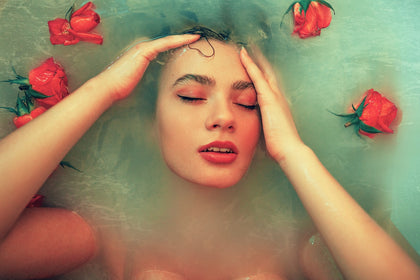Whether given as a romantic gesture or lining a pretty garden in full bloom, roses make people feel good. And thanks to their gorgeous scent and anti-inflammatory properties, rosa damascena, or the "dusk rose," has been included in skincare routines for centuries.
Many people use rose water as part of a natural hair routine. Some believe it helps reduce oiliness and encourages a healthy scalp. And, of course, the pleasant scent leaves you smelling like you've been rolling around in a bed of roses. VEGAMOUR spoke to an expert to learn more about rose water for hair — plus, find out what natural hair wellness products you should use to care for your hair and scalp effectively.
What Is Rose Water?
Rose water is made by distilling rose petals with steam to extract the essential oils. It's often used as an alternative to chemical-laden perfumes and has culinary and medicinal values. It's something that's been used for thousands of years and is thought is have originated in what is now Iran. The rosa damascena, in particular, symbolizes love, faith, purity and beauty, which has bolstered its worldwide popularity.
Shop: Scalp Health Kits
The Benefits of Using Rose Water For Hair
Adding rose water to your routine could help improve your scalp health and the overall appearance of your hair. "Rose water has anti-inflammatory properties that can help soothe the scalp and skin. Additionally, rose water can help balance the pH levels of the scalp and hair, which can lead to healthier hair," said Mohta. Here are more benefits of using rose water for hair.
- Fights frizz. If you struggle with frizzy and dry hair, rose water can deliver a hit of hydration. The solution has moisturizing properties that tame frizz and add shine to dull strands — excellent for those with curly or dry hair.
- Acts as an anti-inflammatory agent. Studies have shown that solutions made with rose water extract have potential anti-inflammatory activity and can help prevent aging. Award-winning dermatologist Dr. Alpana Mohta MBBS, MD, DNB, told VEGAMOUR, "Rose water is a natural by-product of the production of rose oil. It is rich in vitamins A, B3, C, D and E, as well as antioxidants and flavonoids."
- Reduces stress with its aromatic scent. Stress is a leading factor when it comes to hair loss. In one study, aromatherapy with rose oil, often found in rose water, helped ease tension and nervous stress in pregnant women in the first stage of labor.
Related: How Inflammation Affects Your Hair
Make Your Own Rose Water
There are many products that include rose water to use on the scalp and hair. However, if you want to take a more holistic approach, you can easily make your own solution by steeping rose petals to capture the oil and essential essences of the bloom. Here's how.
- Collect approximately half a dozen scented roses and some distilled water to start.
- Remove the rose petals from their stems, put them in a strainer and rinse under warm water.
- Put the petals in a large pot and pour the distilled water over them.
- Put a lid on the pot.
- Let the rose petals simmer on medium heat until they lose their color — approximately 20 minutes.
- Strain the petals from the water and discard them.
- Pour the cooled rose water into a glass container and store it in a cool, dark place.
Adding witch hazel to the solution will further reduce inflammation around the scalp, but use it in moderation and consult with a doctor if you're struggling with specific skin conditions. If you're working with dry hair or a dry scalp, adding a nourishing agent such as jojoba or coconut oil can help maximize your natural luster.
See: 12 Ways to Use Marula Oil in Your Beauty Routine
How to Use Rose Water on Hair
To indulge in roses' many benefits, apply rose water to the hair and scalp directly. "Rose water can be used as a final rinse after shampooing and conditioning to help lock in moisture," Mohta said. "It can also be sprayed onto the scalp and hair throughout the day to help refresh and hydrate the hair."
- Use as a post-shampoo rinse. Mohta suggested a quick rose water hair rinse after using a shampoo and conditioner to reap the benefits. Rinse after a few hours or leave in.
- Add it to your shampoo and conditioner. You can also add rose water to your favorite gentle shampoo and conditioner to nourish and further revitalize hair Mohta suggested.
- Use as a mist. A rose water mist will smooth natural hair and leave a great scent if you struggle with frizz.
Also: How to Tame Frizzy Hair
Scalp Care Is Essential to Hair Health
Good scalp care can lead to healthier, less damaged hair. And while rose water might be able to help balance your scalp, sometimes your scalp needs more — especially when it comes to buildup. GRO Scalp Detoxifying Serum is perfect for all hair types and is packed full of natural ingredients. The vegan proteins and minerals in the formula gently remove irritating buildup and work to soothe scalp damage actively. Willowherb safely reduces the appearance of white flakes, and Zinc PCA absorbs excess oils, reduces irritation and supports the skin's natural moisturizing factors. This weekly vegan treatment will visibly reduce irritating symptoms in as little as three days after initial use.
Related: How to Exfoliate Your Scalp for Healthier Hair
A Rosy Future?
Rose water is a beautifully scented, natural solution that is gentle enough to use daily to help balance your scalp and reduce hair frizz while offering anxiety-reducing aromatherapy benefits.
The best approach to a healthy scalp and hair is a holistic one, however. Eating right, exercising regularly, reducing stress, getting plenty of sleep and staying hydrated are all important. Additionally, incorporating a natural, toxin-free hair wellness routine will help support a healthy scalp and vibrant, thicker, fuller hair!
#include-related-slider#
More From VEGAMOUR
- Shop: Nicole Franzel Arroyo's Top VEGAMOUR Picks
- Does Rosemary Oil Really Help With Hair Growth?
- Do You Know Your Scalp Type?
Photo credit: Vitalii Odobesku/Pexels
Back



















